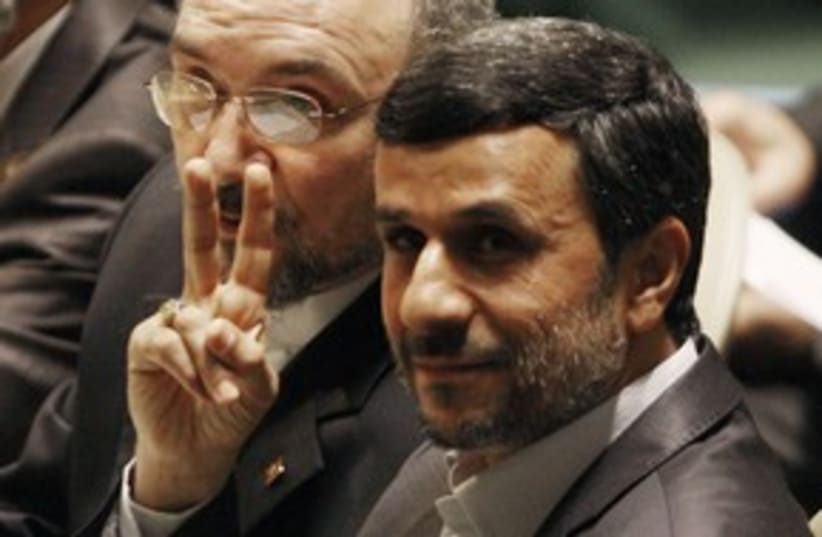The US and its European allies are tightening the noose around the neck of the Iranian leadership with sanctions against their Central Bank, as well as a potential embargo on their much-needed oil exports. Underlying these tentative steps is a growing desire to convince Tehran to abandon its nuclear development programs.
Observers remain very concerned that Iran will not limit its nuclear aspirations to civilian uses, given Tehran’s expanding ballistic missile arsenal and uranium enrichment capabilities. Steady advances in developing new ballistic missiles means that targets across the Gulf, in Israel and as far away as Turkey can now be reached from Iranian soil. The United Nations’ International Atomic Energy Agency has reported that Iran is enriching uranium at its underground Fordow plant, and is making significant progress towards producing weapons-grade uranium.
As Washington attempts to formulate an effective diplomatic response, Iran continues its haphazard search for a meaningful deterrent capacity.
For example, if Iranian oil exports were ever blockaded by Western navies, Tehran would be denied the hard currency that it requires to stay solvent and satisfy at least some of its citizens’ basic needs. To counteract this potential threat, Iranian leaders are boasting about their ability to blocking the entire Straits of Hormuz, even though such an action would be in clear violation of international maritime law.
Sealing off the Straits of Hormuz would put a stranglehold on over 20 percent of the world’s oil supply, and could lead oil prices to shoot up by 50 percent, severely damaging the global economy. Iran has an extensive supply of mines to lay in shipping lanes, if needed, but prior efforts to close the straits during the Iran-Iraq war in the mid-1980s were inconclusive.
In response, the US Defense Department has made clear that, despite Iranian rhetoric, American ships of the 5th Fleet will continue to patrol the region and work with other navies, such as the Saudis, to ensure freedom of transit for commercial and other vessels. Of course, the US also maintains significant airbases in Qatar, Bahrain and the United Arab Emirates to complement is extensive naval presence.
Despite the overwhelming military advantages that the US enjoy over Iran, there is still a risk that the “low boil” economic and rhetorical confrontation currently playing out could escalate suddenly and unexpectedly into something much more serious and much less manageably.
Some commentators are advocating for a discrete, pre-emptive military strike on Iran that would eliminate the nuclear threat. But starting wars are easier than ending wars, as we have seen clearly in both Iraq and Afghanistan. Although the balance of forces does not favor Iran, they still have the capacity to inflict serious damage and loss of life on US soldiers and sailors and airman, as well as their neighbors in the region.
To what extent are the shrill anti-American voices coming from an increasingly desperate Iranian leadership primarily aimed at a disgruntled and impatient domestic audience? As the value of Iranian rial has plummeted recently against the US dollar, Tehran may wish simply to distract its citizens from the increasingly intractable problems they are facing at home.
In need of more allies internationally, Iranian President Mahmoud Ahmadinejad’s visit this week to Venezuela, Ecuador, Nicaragua and Cuba shows that Tehran is working diligently to overcome its isolation and will look for friends wherever they can be found. Tensions with the US will only increase with the recent decision by an Iranian court to sentence American citizen Amir Mirzaei Hekmati to death on charges of spying for the CIA. Of course, Hekmati actually received a trial, which fellow American citizen and al-Qaeda member Anwar Al-Awlaki was denied before he was killed by a CIA-targeted drone. So at least that was nice of the Iranians!
Regardless of Tehran’s next move, a strong US military will be essential to ensure that Washington has the negotiating leverage necessary to bring them to the table to talk and resolve any disputes. However, at a time when Tehran has increased its saber-rattling, US President Barack Obama and his administration are planning to significantly downsize and consolidate the US military as part of a wide-ranging strategic review. Expectations are that the Department of Defense will soon face the biggest budget cuts since the end of the Cold War.
Tehran may interpret these developments as Washington turning its back on the Middle East, where so much American blood and treasure has been spent over the past decade.
Is Iran in 2012 on the verge of making the same mistakes that Japan made in the years leading up to 1941?
In response to a barrage of sanctions, Tokyo eventually determined that conflict with the US was inevitable and that they could benefit from taking the initiative. The Japanese leadership that pushed for war were badly mistaken about American resources and resolve. History soon proved the Japanese military planners wrong, after a tremendous loss of life and the widespread destruction of their homeland.
Let us hope that the current government in Tehran does not stumble inadvertently down the same path. For their own sakes as well as for ours.
The writer is a commentator who divides his time between the United Kingdom and Southern California. He has appeared on CNN, CNBC, BBC and Sky News, and has been featured in the New York Times, the Wall Street Journal, the Washington Post, the Financial Times and the Economist.
